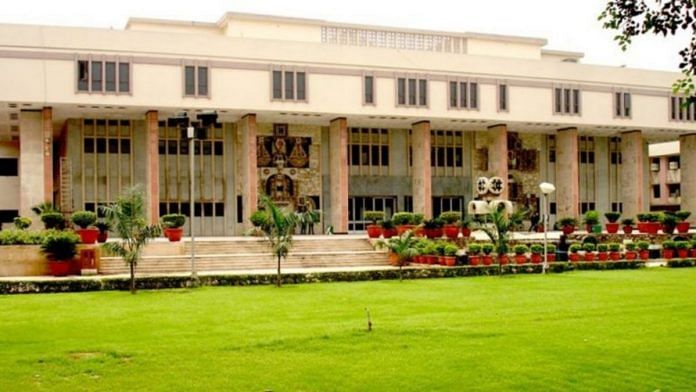New Delhi: The Delhi High Court Monday reserved its judgment on a batch of petitions challenging the constitutional validity of the exception for marital rape in the Indian Penal Code (IPC).
The order was passed by a bench comprising Justice Rajiv Shakdher and Justice C. Hari Shankar, which rejected the central government’s request, made through Solicitor General Tushar Mehta, to defer the matter till comments from all stakeholders are received and ordered.
“We have indicated during the course of hearing to Mr Mehta that in an ongoing matter, that may not be possible as there is no terminal date when the consultation process will get over. Since counsel for the parties have addressed arguments, judgment is reserved,” the court said.
The matter has now been listed on 2 March, and the lawyers for all the parties have been directed to file their written submissions in the meantime.
Also read: ‘Have 50 nations got it wrong?’ Delhi HC asks as it looks into IPC exception for marital rape
The case
The court is hearing petitions filed by two NGOs, RIT Foundation and All India Democratic Women’s Association, and two individuals, challenging the constitutional validity of the second exception to Section 375 of the IPC.
Section 375 of the IPC defines the offence of rape, but carves out an exception for sexual intercourse between a married couple. “Sexual intercourse by a man with his own wife, the wife not being under fifteen years of age, is not rape,” the exception reads.
In a 2017 verdict, the Supreme Court had read down this exception to increase the age of consent for sexual intercourse within marriages from 15 years to 18. However, this case dealt exclusively with cases of child marriage, and not with the wider issue of marital rape.
‘You have to bite the bullet’
During Monday’s hearing, SG Mehta once again told the court that the Centre can take a stand on the pleas only after consulting state governments and other stakeholders. He also informed the court that a communication was sent to the state governments and the National Commission for Women on 10 February, demanding their suggestions on the issue.
Mehta submitted that no response had been received so far from the states. The court, however, lambasted Mehta, saying, “We can’t keep the matter hanging like this. You can have your consultation going on. To say that you defer it endlessly — that can’t happen.”
“You have to bite the bullet. Say if you agree with the petitioners or not,” the court added.
Centre’s stand still unclear
The central government had filed an affidavit on the pleas in August 2017, saying that marital rape could not be added as an offence to the IPC, as it could have a “destabilising effect on the institution of marriage” and become an “easy tool for harassing husbands”.
It had also highlighted difficulties in investigating allegations of marital rape, saying “the question is what evidences the courts will rely upon in such circumstances, as there can be no lasting evidence in case of sexual acts between man and his own wife”.
However, since the court began hearing arguments in the matter in December last year, the Centre has refused to take a stand on the issue.
In a hearing last month, the Centre had told the high court that the issue of criminalisation of marital rape involves “family issues” and the dignity of a woman, and cannot be looked at from a “microscopic angle”. Mehta had then asked for “reasonable time” to make the Centre’s position on the issue clear.
In an additional affidavit filed on 3 February, the central government had urged the high court to defer the hearings to await the outcome of a consultative process with stakeholders.
The affidavit said, “…considering the social impact involved, intimate family relations being the subject matter and this Hon’ble Court not having the privilege of having been fully familiarised with ground realities prevailing in different parts of society…taking a decision merely based upon arguments of (a) few lawyers may not serve the ends of justice”.
On 7 February, the court once again gave the Centre two weeks’ time to make its stand clear.
However, it may be noted that the Centre hasn’t formally withdrawn its 2017 affidavit so far, leading lawyers to believe that the affidavit therefore makes the Centre’s stand clear.
(Edited by Rohan Manoj)
Also read: 3.9% Indian women who were ever married reported sexual violence from spouse, 9.7% in Karnataka



